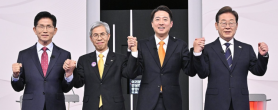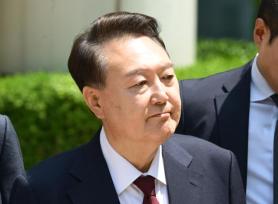
While proponents frame the move as a way to bolster national financial sovereignty, critics warn of regulatory gaps and potential misuse.
The opposition Democratic Party (DP), led by presidential contender Lee Jae-myung, has proposed the issuance of a stablecoin backed by the South Korean won.
The party argues that such a step would counterbalance the increasing dominance of the U.S. dollar in global digital asset markets and advance South Korea’s position in the fast-evolving financial technology landscape.
Stablecoins — digital assets pegged to traditional fiat currencies like the dollar or euro — have drawn attention worldwide for their promise of faster, cheaper transactions. Their growing use as payment methods, however, has also raised red flags among regulators due to the risk of illicit activity and insufficient oversight.
During a nationally televised debate on May 18, Reform Party candidate Lee Jun-seok pressed Lee Jae-myung for details on the Democratic Party’s proposal.
“I’m curious about what mechanisms the DP will establish to prevent the illegal circulation of won-based stablecoins,” Lee Jun-seok said. “How much will be set aside as reserves?”
Lee Jae-myung replied that the proposed system would rely on a “one-to-one reserve system” to ensure stability, but stopped short of addressing concerns over criminal misuse or the framework for financial compliance.
Those concerns are not unfounded. According to blockchain analytics firm Chainalysis, stablecoins accounted for roughly 63 percent of all illicit crypto transactions globally in 2024.
The Financial Action Task Force has since called for the application of international anti-money laundering standards to digital assets, including stablecoins.
Adding to the scrutiny, experts gathered on May 19 for a panel discussion hosted by the Federation of Korean Industries, where they urged lawmakers to proceed with caution.
“Korea should expedite second-phase legislation in line with global trends,” said Kim Hyo-bong, an attorney at Bae, Kim & Lee.
Kim noted that the United States is advancing its comprehensive digital asset regulation — the so-called GENIUS Act — while the European Union has already enacted its Markets in Crypto-Assets (MiCA) regulation.
Lee Seung-seok, a researcher at the Korea Economic Research Institute, warned that premature adoption of stablecoins — particularly those tied to foreign currencies — could have unintended macroeconomic effects.
“If dollar-based stablecoins become widely accepted in Korea, they could trigger structural changes in the won-dollar exchange rate,” he said. “This could lead to increased demand for foreign currency and decreased use of the won, potentially causing exchange rates to spike.”
Copyright ⓒ Aju Press All rights reserved.




